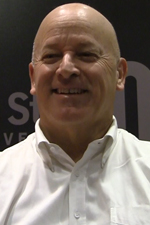Abstract

“Multiculturalism as a Way of Life”
December 28, 2015
Location: Valley Library, Oregon State University. Watch Video | Download Transcript (PDF)
In the interview, Lawrence describes his family background and upbringing, noting in particular his Native American lineage, his struggles in school, and the impact that exposure to communities of color made on him as a youth. From there, he discusses his initial college experience at the University of Oregon, the need during that time for him to conceal his sexual orientation, and the difficulties in Eugene that led to his transfer to Oregon State University.
In recalling his years at OSU, Lawrence reflects on his initial impressions of the university, his academic progression within the Business Administration program, and his involvement in Greek life. A major topic of conversation is his leadership of the Minority Affairs program at the Memorial Union, and in this he reflects on the program's activities, his perception of the climate on campus for people of color, and the individuals who were important to him during this time. Lawrence then shares his memories of the environment at OSU for lesbian, gay, bisexual and transgender individuals during his undergraduate years, stressing in particular the fear of violent conflict that compelled him to suppress his identity.
Lawrence next provides an outline of his graduate studies at Thunderbird University, noting the positive impact that the school's international focus made upon him, while also recounting the atmosphere of hostility that prevailed toward LGBT students. From there, Lawrence shares some of the highlights of his working years in software development, team building, and independent consulting. Throughout these recollections, Lawrence stresses the important role that his multicultural perspective has played in his work and success.
As the interview begins to wind up, Lawrence describes his involvement in the field of psychometrics, recalls his decision to move to New Zealand, and expresses his affection for the people and culture of New Zealand, as evidenced by his obtaining dual citizenship and serving as a donor parent to seven children. The session concludes with a discussion of Lawrence's return to Oregon, his marriage to his longtime partner, his thoughts on the culture and economic well-being of the south coast of Oregon, and his sense of OSU's progression over the years of his association.

